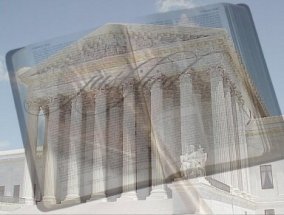
“Who shall lay any thing to the charge of God’s elect? It is God that justifieth. Who is he that condemneth?” (Rom. 8:33–34)
I recently read (again) the “New Horizons” article “Cleared and Approved by the Supreme Court!” by J.G. Vos in my research for our upcoming studies. It seems that this is often in the forefront of our conversations of late (and perhaps more often that we think because of the current heresies [old error mixed with new error] being perpetrated on the immature and unlearned in the faith ). In Vos’ article he asks “Have you been cleared and approved by the Supreme Judge of the universe?” In other words, “are you truly justified in the sight of God by His free grace and imputed righteousness”? Thus, this encouraged me to challenge us once again on this important subject and what we believe regarding our justification. The following along with our forthcoming recommended reading should whet your appetite for more reading and study:
Shorter Catechism Q. 71. How is justification an act of God’s free grace?
A. Although Christ, by His obedience and death, did make a proper, real, and full satisfaction to God’s justice in the behalf of them that are justified; yet inasmuch as God accepteth the satisfaction from a surety, which he might have demanded of them, and did provide this surety, His own only Son, imputing His righteousness to them, and requiring nothing of them for their justification but faith, which also is His gift, their justification is to them of free grace.
“It is basic to an understanding of justification as set forth in Scripture, that we recognize that justify and justification are legal terms; they concern the Christian’s relation to God as Judge. Justification concerns the Christian’s standing in relation to God’s act of judging. In the Bible, the term justify means “to declare righteous” or “to pronounce righteous.” It does not mean “to make righteous.” This important distinction is obscured by some modern translations of the Bible. To understand justification as “making a person righteous” is to confuse justification with sanctification. Sanctification is an inward change in character. Justification is a change in relationship to the law of God. “Justification is an act of God’s free grace, wherein he pardoneth all our sins, and accepteth us as righteous in his sight, only for the righteousness of Christ imputed to us, and received by faith alone” (Shorter Catechism, Q. 33). Justification includes pardon, but it is more than pardon. It includes: the pardon or forgiveness of all our sins, plus the pronouncement that we are positively righteous.”
and
“The only ground of justification is the finished work of Christ—his blood and righteousness. This is the basis on which God can pronounce us righteous: “To declare … his righteousness: that he might be just, and the testifier of him which believeth in Jesus” (Rom. 3:26). Because Christ lived a perfect life and shed his blood on the cross, God can impute or credit this to you and me, and on this basis declare that we are righteous.”
This begs the question, is Christ your righteousness?
Because of Christ,
TheologyGirl-ReformedWomen
Copyright ©2006-2020
All Rights Reserved